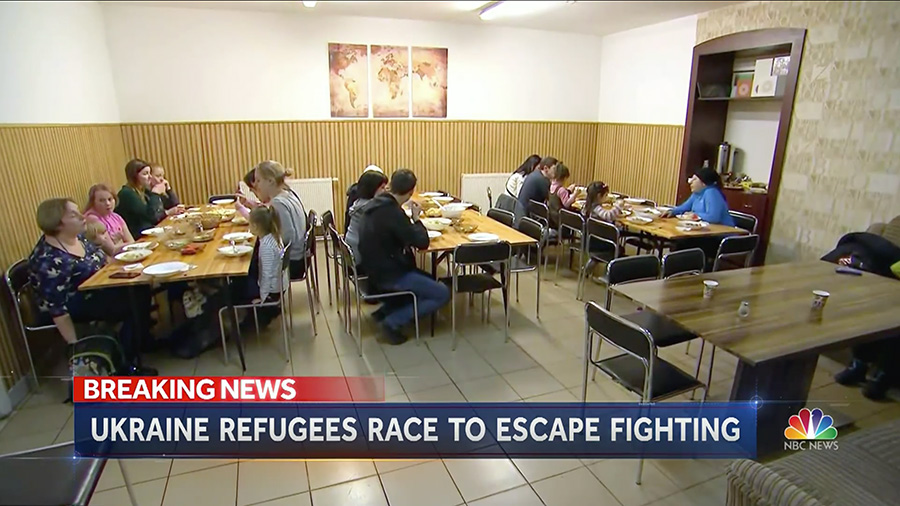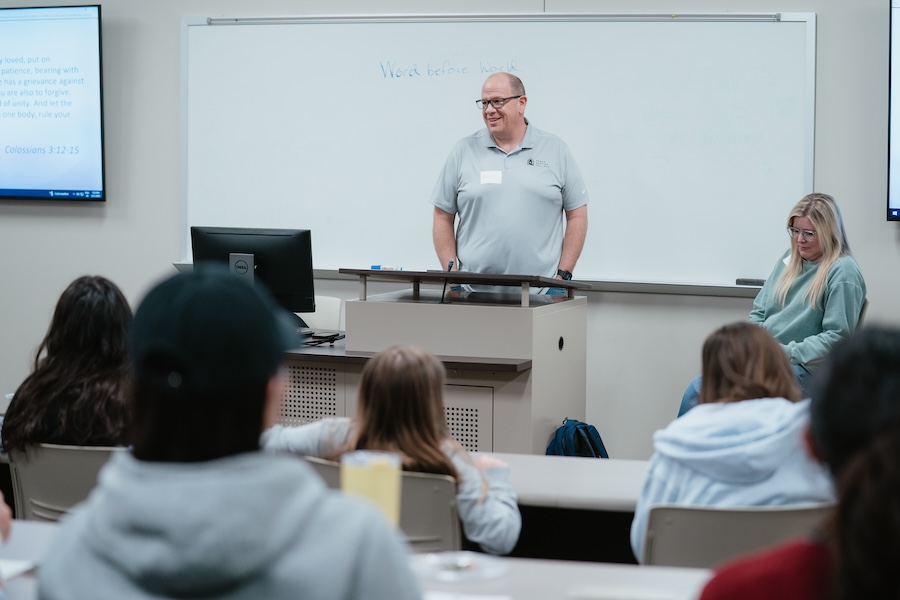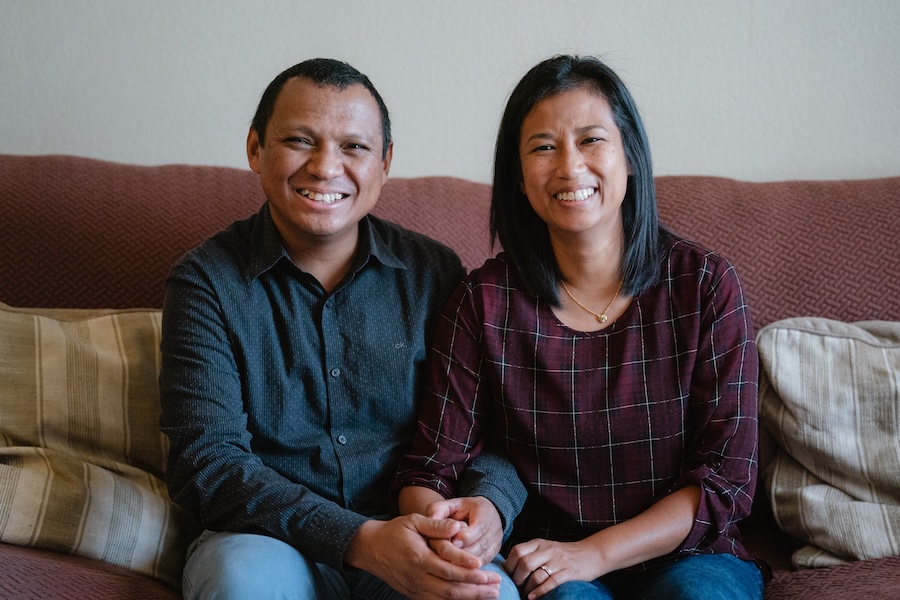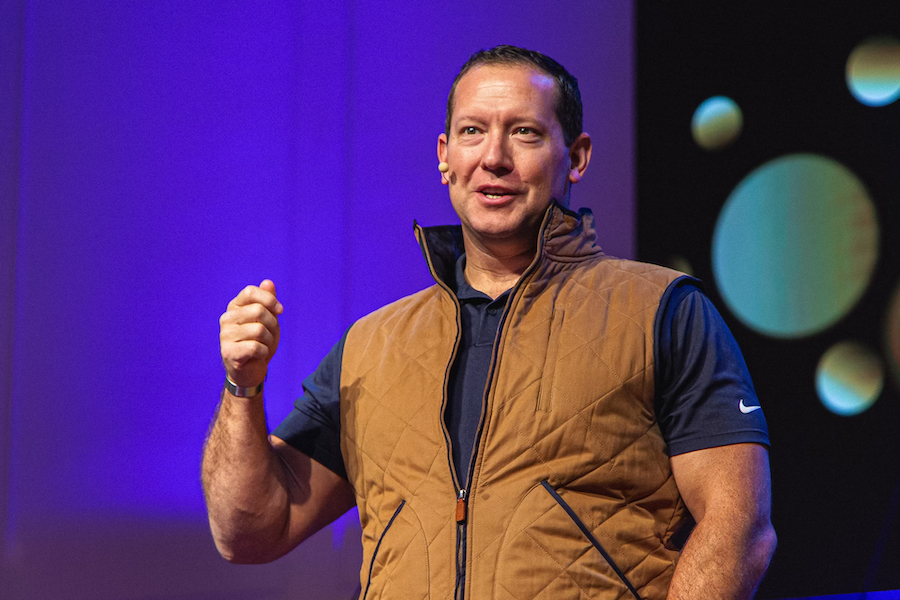Resolved: Building bridges during war


*Editor’s note: This article is based upon three interviews with Yaroslav Pyzh, which took place on September 16, 2021, February 26, 2022, and March 28, 2022. This article will appear in the spring issue of Southwestern News. In light of changing events in Ukraine, it is being posted today in order to provide current information about Pyzh and the Ukrainian Baptist Theological Seminary, following up on an earlier story.
“It’s my home.”
Uttered gently, yet resolutely, the desire to serve “where God called” him in his native-Ukraine homeland is why Yaroslav Pyzh (‘09, ‘12) chose to stay in the Eastern European country as Russian forces invaded. Pyzh made the decision long before Ukrainian President Volodymyr Zelenskyy mandated Ukrainian men between the ages of 18 and 60 remain in the country to fight on behalf of their country.
Since the war began in the early morning hours of February 24, Pyzh says millions of Ukrainians have fled to the neighboring countries of Poland, Moldova, Hungary, and Romania. Pyzh, who has served as the president of the Ukrainian Baptist Theological Seminary in Lviv, Ukraine, since 2013, led his faculty and staff to adjust their focus so they could minister to their fellow Ukrainians.
“One day you are teaching theology, doing academic work, and the next day you are serving the needs of people,” Pyzh says. “And I think that’s the best way it’s supposed to be. If things change, you have to change. If that’s a time of serving their needs, that’s what you need to do. If it’s time to teach, you teach.”

When the war began, Pyzh and his staff transitioned their seminary from an institution of theological education to a facility where faculty, staff, students, and alumni are the hands and feet of Jesus to the displaced Ukrainians traveling through Lviv seeking to make it the last 40-miles to the shared border with Poland and safety.
Serving the needs of their fellow Ukrainians has meant converting three of the seminary’s buildings into makeshift dormitories for displaced people. The buildings, which were completed earlier in 2022, were designed to equip students to share the Gospel. During the first 33 days of the war, in the same buildings, the UBTS team has shared the Gospel, conducted daily worship services, and led people to faith in Christ as more than 5,000 women and children have come through the campus for help on their way out of the country.
The provision of buildings is just one of the ways Pyzh says he has seen God go before him as He has positioned the seminary to offer aid to their fellow Ukrainians. When the war first began, the seminary was helping 400 people daily. By the middle of March, that number dropped to an average of 150 people daily.

The work and ministry of the seminary caught the attention of international news outlets early in the war – including “NBC Nightly News with Lester Holt,” which featured the seminary’s work in the March 2 newscast.
While the seminary has been able to assist Ukrainians in Lviv, they have also been able to offer support and supplies to another 5,000 people across the country, due in part to many Southern Baptists. Send Relief, Texas Baptist Men, and Baptist Men of North Carolina have “given money to buy humanitarian aid” supplies or have supported the seminary through other means, Pyzh explains. Another provider has been Goya Foods, an American-based Latin foods company that has supplied the seminary with canned goods. The seminary’s own American-based Ukraine Partnership Foundation has also raised support to aid UBTS and its work.
The assistance has enabled the seminary to maintain a route from Poland to Lviv to receive supplies. Once in the city, “people from other parts of Ukraine come into Lviv and pick up those loads and take it to the places that have the greatest need” across the Eastern European nation, Pyzh says.

Stories of people finding hope in Christ have been part of the testimony of the school’s ministry. During the March 28 interview, Pyzh shared, “We had a miracle happen today.” He explained during the morning’s daily chapel service, the leader of the service spoke of a bullet-proof vest for physical protection, and asked the worshippers, “What defends your body from spiritual bullets and how can you protect yourself from that?” Following the service, a lady approached the leader and said, “I would like to accept the Lord Jesus Christ as my Savior, and what can I do about that?” The leader explained the Gospel to her and, “They prayed, and she accepted the Lord,” Pyzh says.
UBTS, which had been teaching classes until the day before the war began, has trained Ukrainians in theological education since its founding in 2000. Seminary leadership is determining how to facilitate a September graduation for their students, while noting it is “a very ambitious goal” but also one that “excites us and gives us a bit of encouragement,” Pyzh explains.
As the school seeks to prepare to commission their students, Pyzh says they are also working to help Ukrainian believers recognize their displacement to other parts of Europe “is actually an opportunity to change their identity from being victims to being ambassadors of the Gospel,” similar to how God used the church in Jerusalem when they were scattered during a time of persecution.
“Most of the people right now, they look at themselves as the victims of the war – refugees,” he says. “But really, if you turn that upside down, they’re not victims. They’re not refugees. That’s the way that God was using the church in Jerusalem. That’s the same way He’s sending out us opening the hearts of people around the globe in Europe, particularly those that were skeptical … and most difficult one[s] to reach. Now, they accept Ukrainians and invite them to live in their own homes.”
Pyzh says the 250,000 to 300,000 believers from Ukraine are more than any other European nation and God can use these believers as a “bridge” between the church and Europeans who are usually “skeptical” of the Gospel. He says he sees two things that have “never happened before” in the situation “that is unveiling in front of us.”
First, he says, “the war united every single person in Europe around Ukrainians,” which has resulted in the rest of Europe helping and accepting Ukrainian refugees. As a result, the second thing that has happened is other Europeans have “shared in the pain and suffering the Ukrainian people are having” and “it’s actually opened them to listen to the Gospel.”
Thusly, Pyzh explains, the Ukrainian people are “the bridge between national churches and the national people in those countries.”
“Christians in different countries, using Ukrainians as the bridge, can actually effectively communicate the Gospel to those people because they are open and they are participating in the life of Ukrainians,” he said. As other Europeans ask Ukrainians to, “‘Tell us your story,’ it’s impossible to tell the story of a refugee without God.”
But the teaching and training of the seminary will also continue – as an extension center in Poland. Pyzh explains International Mission Board missionaries and Ukrainians who were serving at UBTS and had to relocate to Poland will establish the extension center in Poland “in order to reach out to Ukrainians.”
“This evil war that we have, it actually turns into something that something good can come out of it, if you use it and use it rightly,” Pyzh says. “So, I’m very excited about what God is doing in Europe. My prayer, and my desire, is to see this opportunity to be used and seized as the moment presents.”

Pyzh explains the experience of ministering while in the midst of war has changed “the way I started praying and the way I started reading Psalms. They became alive, I guess. My prayer is not that logical anymore – it used to be. Prayer is much more emotional” as he no longer “tries to reconcile” everything in his prayer time.
Pyzh also realizes his faith is different as “faith transitioned from statement, beliefs, and doctrines, into actions.” Prior to the war, Pyzh explains, “it was easy to talk about what you believe” but “in the time of war, faith is not about statements. Faith is about statements that lead to some actions.” Correlating faith to the manna God daily supplied to the children of Israel, Pyzh says, “You cannot store faith today for tomorrow,” observing that “every day requires its own faith.”
Pyzh came to faith in Christ as a 12-year-old in 1989, who was growing up in Soviet-controlled Ukraine. He attended a church and asked for a New Testament – not common in the then-communist country. After reading the Gospels, he realized his future was not that “shiny” and he “was going straight to hell,” which motivated him to profess faith in Christ as his personal Lord and Savior. From that time on he began attending a Baptist church in Ukraine.
However, Pyzh’s story doesn’t begin with his salvation experience, but rather with his grandmother and her profession of faith.
Following World War I, Russian soldiers were imprisoned in Germany and German evangelicals began to share the Gospel with the prisoners. Upon their release, the converted Russians began sharing the Gospel on their trek back to their homeland via the villages in Poland and Ukraine. Hearing the Gospel preached to her in Russian, Pyzh’s grandmother accepted Christ in her small Polish village. In 1949, Pyzh’s grandmother and grandfather were part of the contingent forcefully relocated from Poland to Ukraine under Joseph Stalin’s orders – along the same road Ukrainians are using today to flee to Poland.
Pyzh says his grandmother was “the most instrumental person” in his life as she was the one who taught him the Lord’s prayer and took him to church. Otherwise, Pyzh says he “was born to a family that was … just a regular Soviet Union family – atheists.”
After the collapse of the Soviet Union in 1991, the first missionary to Ukraine entered the country and spoke in Pyzh’s church. The missionary introduced the concept of serving the Lord and Pyzh says that is when he heard God speak to him.
“While listening to his presentation, God actually spoke to me, like directly told me, ‘I would like you to be a minister for My church,’ which did not make any sense to me because I grew up in a non-Christian family,” Pyzh explains. “So, from that time on, I was trying to … figure out what a minister for the church means. And the simplest description that I got is the person that preaches, so I started preaching at the age of 14.”
Pyzh studied at Kiev Baptist School and earned bachelor’s and master’s degrees from Moscow Baptist Theological Seminary.
In 2006, Pyzh moved his wife, Nadya, and their then nine-year-old son and five-year-old twins to Fort Worth so he could begin working on his Doctor of Philosophy degree at Southwestern Baptist Theological Seminary. Pyzh, who studied under Malcolm Yarnell, research professor of theology, focused his doctoral dissertation on the ecclesiology of Eastern European Baptists.
After his 2012 graduation, Pyzh assumed the leadership role of the Ukrainian seminary in 2013. Through his leadership, the seminary has focused on preparing students to serve in the local church. The result has been growth. In 2014 the seminary had 45 students and in 2021 had 1,200 students. Since 2014, each year the incoming number of students has doubled, he adds.
The lessons Pyzh learned at Southwestern taught him to “learn to love God. That’s the place where I learned to love church and people.” These are the same lessons he is using today as he loves the people of his homeland.
“Southwestern has been my home,” Pyzh concludes. “I hope that all the graduates of Southwestern will have the same spirit whenever they go, whatever they do. I really appreciate Southwestern. Those were very good years of my life and that’s here now, too. It was very influential.”
If you would like to help the Ukrainian Baptist Theological Seminary in their work, you can contribute at upfmissions.org and select “donate.”
Ashley Allen (’03, ’09) is the managing editor of Southwestern News.
Pictures for this piece were supplied by the Ukrainian Baptist Theological Seminary, the Ukrainian Partnership Foundation, and Unsplash.



